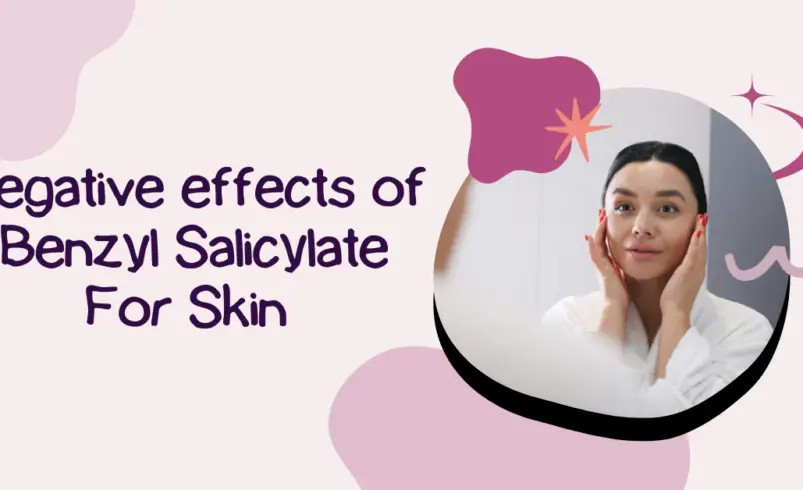What are the negative effects of Benzyl Salicylate For Skin?
- April 7, 2025
- 0
What Is Benzyl Salicylate? Benzyl salicylate is a chemical compound used in many personal care products. It adds scent and absorbs UV light. You’ll find it in perfumes,
What Is Benzyl Salicylate? Benzyl salicylate is a chemical compound used in many personal care products. It adds scent and absorbs UV light. You’ll find it in perfumes,

Benzyl salicylate is a chemical compound used in many personal care products. It adds scent and absorbs UV light. You’ll find it in perfumes, lotions, sunscreens, shampoos, and conditioners. Most people don’t notice it. Some experience skin issues over time. It’s common in everyday skincare.
Thank you for reading this post, don't forget to share!
Manufacturers use it because it blends well with other ingredients. It helps perfumes last longer on the skin. It also boosts the product’s ability to protect against sunlight. Though useful, benzyl salicylate for skin raises concerns for people with sensitive skin.
This compound hides in a range of products. You might be using it now without knowing. These include:
Check product labels. It may be listed under its full name or as part of a fragrance mix. Many labels group it under “parfum.” This makes it hard to spot.
| Property | Description |
| Chemical Name | Benzyl 2-hydroxybenzoate |
| Used In | Perfumes, lotions, sunscreens, deodorants |
| Main Purpose | Fragrance and UV light absorber |
| Known Risks | Irritation, allergy, long-term sensitization |
| Regulated In | European Union (restricted concentration) |
| Listed As Allergen | Yes, by European Scientific Committee on Consumer Safety (SCCS) |
| More Info | Jordan Writes – Benzyl Salicylate Overview |
Many people apply products without checking ingredients. If your skin stings or itches, benzyl salicylate might be the cause. It can lead to:
These symptoms might show up quickly. For others, it may take days. Repeated use can worsen the effects.
Even a small amount can cause problems. People often overlook these signs. They think it’s just “sensitive skin.” The real reason might be this chemical.
Benzyl salicylate is a known allergen. Some people develop contact dermatitis. This is a red, itchy rash caused by direct skin contact. It can appear after one use or after several uses over time.
Symptoms may include:
This chemical can cause photosensitivity. That means skin becomes more reactive to sunlight. You may see sunburn-like symptoms after use. This includes redness, peeling, and even pain.
Using it over time increases risks. Skin may stop tolerating it. You might not notice at first. Then reactions start happening. The longer you use it, the more likely you’ll see issues.
Long-term risks include:
The compound can enter the skin. It may affect deeper layers. Some studies suggest it can disrupt hormones. Research is still going on. But concerns are growing.
If you have sensitive skin, caution is key. This compound might not suit you. Sensitive skin is thin, dry, or easily irritated. Benzyl salicylate can trigger flare-ups.
Common reactions include:
Avoiding this ingredient helps protect fragile skin. Opt for fragrance-free products. Always patch test new products. Watch for signs of discomfort.
The chemical structure of benzyl salicylate is reactive. It binds with skin proteins. The immune system may treat it as a threat. This causes inflammation. Each use can make the skin more sensitive. With time, even small amounts cause discomfort.
In the EU, benzyl salicylate for skin is on the allergen watch list. Companies must list it if concentrations go beyond:
The International Fragrance Association (IFRA) sets limits benzyl salicylate for skin too. These aren’t laws, but many brands follow them. The US doesn’t require detailed labeling. Consumers often stay unaware.
Health authorities recommend limiting exposure of benzyl salicylate for skin. Especially for children and pregnant women. There’s concern about hormone disruption, though more research is needed.
Stay alert. Be cautious when trying new skincare or perfume. Follow these steps:
If you’ve reacted before, consult a dermatologist. They can test for allergies. They may suggest alternative products.
Today, many brands offer safer options. You can look for:
Some ingredients have a lower risk profile. Look for plant-based formulas. Stick to products with simple labels. Fewer ingredients mean fewer problems.
It may be written as:
If the product smells strongly, check the label. Even if it’s not listed, it could be in the fragrance mix. Look for brands that disclose full ingredients.

You don’t need to avoid benzyl salicylate for skin completely. But you should understand what it does. For most people, it’s not dangerous. For others, it causes discomfort or long-term damage.
If you have sensitive or allergy-prone skin, it’s safer to stay away. Fragrance-free products give you more control. They reduce your exposure to this and similar chemicals.
Skincare should support your skin—not harm it. Knowing what’s in your products is the first step. Avoiding potential irritants can improve your skin’s health.